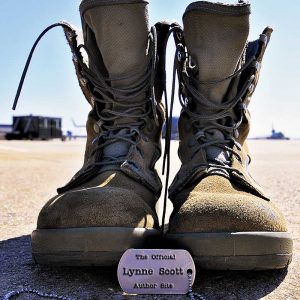Question: Why do I use so many Marines?
Answer: I could come up with several extremely rude and crude comments about this question, but I won’t.
The simple answer is that I’m lazy. When I say “Marine” most people have an immediate image that comes to their mind – that recruiting poster of the incredibly attractive Marine in his dress blues with his sword and the slogan, “The Few. The Proud. The Marines.”. Based solely on the great advertising by the Marines, you know who my character is and what he stands for. All I have to do is give you his name, rank, and physical description and you alter the poster to suit.
One of my beta readers told me that I look at Marines through rose-colored glasses. He works around Marines all the time and feels that most of them really aren’t all that cool. I get that. All Marines are not honorable people who always do the right thing. All members of the military are not responsible men with common sense. All Air Force guys aren’t smarter than the men in the Army. (Having spent a lot of years in the Air Force, I can tell you that many of them aren’t any smarter than the damn boots they’re trying to put on.) But the same is true of any group of people. All cops and fireman aren’t nice guys and heroes. All teachers aren’t selfless. And all cowboys don’t have cute butts.
One of my jobs as an author is to create a hero/heroine who has the potential to overcome the conflicts in my story. I have to pick someone who provides credibility to the story. If I want to send a small force of well-trained men in to a dangerous situation where they need to have tactical and weapons skills, then I can’t send a bunch of dweebs from accounting and finance to do the job. I can send one person, who gets caught up in the middle of a mess, but without the trained fighters, he’s going to get greased pretty quick.
I’m not opposed to using the other services. I have a particular fondness for Rangers and military police from all branches, but I have a tendency to avoid the Green Berets and SEALS as primaries. As I’ve mentioned before, I don’t know enough of them to ask for help in getting the details right. And I don’t use the Navy much because even they don’t understand their own organizational charts.
I use the military police because I have a fair-sized group of military cops who I can call upon for tactical help and guidance. How do you clear a room? How does a small tactical team approach a building? What the hell do you actually call that thinga-ma-bob hanging from his gear in the center of his chest in this picture? Once they’re done screwing with me, they always step up and help. And when I get it wrong, they don’t hesitate to throw the bullshit flag on a regular basis. That’s what they’re there for.
Why not the Air Force? Well… short of a few career fields that go do really interesting and exciting things, most Air Force personnel are not generally in a position to get in the kind of trouble my folks seem to get into. And, with the exception of those few career fields, airmen also aren’t trained for trouble. All Air Force personnel have weapons qualification training once a year, and for many of them, that’s the only time they ever handle a weapon. Most of them barely remember year to year to keep the muzzle pointed away from other people. While many of these folks are cool and interesting people, just how is my avionics technician supposed to get caught up in something dangerous and, once in it, why would anyone believe that he has the necessary combat skills to get out of it. Not that a detail like that stopped Tom Clancy for credibly using an Air Force weather nerd in Red Storm Rising. But, realistically, the average Air Force back shop technician would be nothing more than “in the way” to those who would have to protect him in the field.
Marines are just easier. And, I mean that in the nicest possible way.

